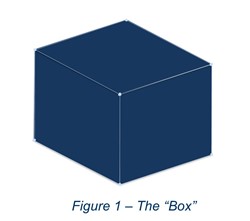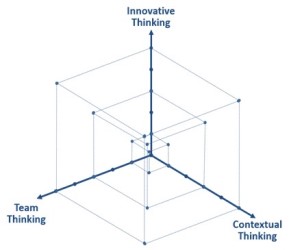SECOND EDITION
By Ryan Daugherty
Washington, USA
and
Dave Ellison
Colorado, USA
Overview
Teams plan and deliver their “products” in an environment of nearly continuous change. The physical environment is becoming less predictable; technological change accelerates each year; legal, regulatory, and political changes seem to occur almost daily; and economic volatility demands increasingly savvy management of resources. The risks are high and require responses that are both timely and effective.
Creating – and developing consensus around – innovative solutions that work in real-world situations and that can be adapted to future conditions is a tough assignment. Doing so while enhancing team capabilities for efficient and effective delivery and the value of the products they deliver is a tall order and a challenge for leading teams to become more “adaptive” in their thinking and their approaches to problem-solving.
About the “Box”…
Lately, we’ve come to refer to conditions that restrict or obstruct new ideas as the “box” and that fresh, innovative ideas only come from “thinking outside” of it or from “disruption” of the processes inside. The “box” has become a metaphor for “old thinking”: opaque, difficult to change, and an impediment to progress.
 While the idea of the box is simple and easy to grasp, the underlying problems are not. The “box” represents the “culture” within which teams plan and deliver their products. The culture, in turn, is made up of a host of different influences – internal and external – which can impede team flexibility and affect the generation and capture of innovative ideas. Just identifying and cataloging all the factors that restrict team adaptability is a daunting task, but maybe we can take a different approach. The solution might simply lie in the way we look at the box.
While the idea of the box is simple and easy to grasp, the underlying problems are not. The “box” represents the “culture” within which teams plan and deliver their products. The culture, in turn, is made up of a host of different influences – internal and external – which can impede team flexibility and affect the generation and capture of innovative ideas. Just identifying and cataloging all the factors that restrict team adaptability is a daunting task, but maybe we can take a different approach. The solution might simply lie in the way we look at the box.
Instead of thinking about the “box” as a roadblock to innovation and adaptability, maybe we can use it to create a framework for focused innovation, disciplined response to changing conditions, and a sound foundation for continuous improvement.
Three “Dimensions”:
Adaptive Teams, teams that effectively adapt to changing conditions, bear the traits of all successful teams. However, certain attributes, at which they are particularly adept, stand out. We have grouped these into three major categories or dimensions.

Figure 2 – The “Box” Redefined
Teams that have established and “balanced” these three dimensions possess the “necessities” for developing and maintaining an effective Adaptive Team culture. Likewise, the absence or significant imbalance of these dimensions diminishes that ability.
Team Thinking: Adaptive Teams recognize that high trust, commitment, empathy, and open collaboration are vital to the success of any team undertaking. But, they also acknowledge the importance of being a “learning team,” and that means much more than working well together and sharing information. They recognize that it’s about “cohesion” not “conformance” and that maintaining a learning environment demands an appreciation of the views, styles, capabilities, and needs of each team member and an ability to both respect and challenge ideas in ways that lead to
More…
To read entire article, click here
Editor’s note: Second Editions are previously published papers that have continued relevance in today’s project management world, or which were originally published in conference proceedings or in a language other than English. Original publication acknowledged; authors retain copyright. This paper was originally published in Project Management Times in May 2020. It is republished here with the author’s permission.
How to cite this paper: Daugherty, R. and Ellison, D. (2020). Adaptive Teams: Rethinking the “Box”; Originally published in Project Management Times, May 2020; republished in the PM World Journal, Vol. X, Issue IV, April 2021. Available online at https://pmworldlibrary.net/wp-content/uploads/2021/04/pmwj104-Apr2021-Daugherty-Ellison-adaptive-teams-rethinking-the-box-2nd-edition.pdf
About the Authors

Ryan Daugherty
Washington, USA
![]()
Ryan Daugherty is the designer/developer of the Process|SimpleTM Platform for Project/Process Knowledge Hubs. He has nearly 50 years of hands-on project delivery management experience with the Boeing Company, CH2M HILL (now Jacobs), among others. He has consulted on public and private sector projects worldwide. Ryan can be contacted at ryandaugherty@ryandaugherty.com RyanDaugherty@RyanDaugherty.com

Dave Ellison
Colorado, USA
![]()
Dave Ellison, P.E. is the founder and owner of Synergy Connects, LLC focussed on leadership and team learning. Dave draws on his 27 years of experience as a project/program manager for CH2M HILL (now Jacobs). In 1995 he led the team that developed and implemented the company’s Project Delivery System. Email: Dave_Ellison@SynergyConnects.com









